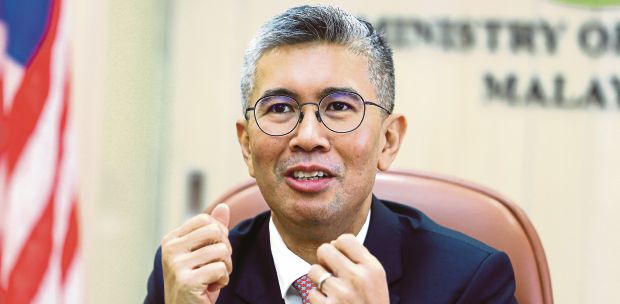KUALA LUMPUR: Malaysia logged its highest ever number of approved investments last year, however, more needs to be done to ensure that the investments are realised.
This includes cutting red tape, upgrading skills and improving facilities.

Malaysian University of Science and Technology's professor of economics Dr Geoffrey Williams said while more investment approvals indicated interest from investors in the country and the success of trade missions specifically aimed at attracting trade, it was only the first step.
"The challenges are to turn approvals into actual investments, and there is no clear strategy on this from the Investment Trade, and Industry Ministry or Malaysian Investment Development Authority (Mida), Williams said.
Based on Mida's data between 2012 to 2022, only 26.3 per cent of approved investments arrived as real investments afterwards.
"Historically, only 26 per cent of approvals deliver actual investments. This is because there is a delay between approvals and actual investments of one to two years on average and when they deliver returns.
"We can expect around RM20 billion over the next four years or so. This puts it into context," Williams said.
He said the reasons behind this included companies giving up on their plans, going to other countries because they have multiple approvals, and inability to find partners or joint ventures.
Tradeview Capital Sdn Bhd founder and chief executive officer Ng Zhu Hann said external factors, such as the economic slowdown in China, which can affect a company's strategies in venturing abroad, or high interest rates, which increase the cost of borrowing significantly, also contribute to this.
Meanwhile, Malaysian Institute of Economic Research economist Dr Shankaran Nambiar said two things must be addressed to improve the economy — upgrade skills and improve facilities, which in turn will make it easier for people to invest in Malaysia while allowing the country to retain investments.
Nambiar said the government should focus on making the country more conducive to business operations, as well as reduce bureaucratic processes for foreign investors, and provide them with good facilities, like utilities and transportation.
This was echoed by Ng, who said the civil service needed to help by reducing bureaucracy and pushing towards welcoming foreign direct investments (FDIs) to commence operations as soon as possible.
Sunway University economics professor Dr Yeah Kim Leng said a high-implementation rate, typically ranging between 80 and 90 per cent during normal economic periods, would enable this year's investment growth to surpass last year's 5.5 per cent, and raise its 2024 gross domestic product (GDP) share above last year's 20 per cent.
"Given heightened uncertainties and challenges facing the global economy this year, facilitating the early start of investment projects will be crucial to offset a possible weakening of external demand."

The weaker ringgit, however, did not appear to be deterring investors.
Jameel Ahmad, who is United Arab Emirates-based online trading brokerage firm GTC Group chief analyst, said the high number of investments entering Malaysia was a strong achievement considering the backdrop of world economic issues, like Japan and the United Kingdom entering into technical recessions just two weeks ago.
"It is also possible that given some of the challenges that western markets are facing in general and that investors are diversifying funds into developing markets, Malaysia has an advantage due to its English-speaking workforce, which carries high benefits for international entities," he told the Business Times.
Getting the right investments
"Perhaps what is more important is whether Malaysia is attracting FDIs that are helpful to upgrade its industrial ecosystem," he said.

National Graduate Institute for Policy Studies Japan's assistant professor of Development Studies Guanie Lim: "To this end, it is probably tempting to rank Malaysia against economies like Vietnam and Indonesia.
"However, these economies are behind Malaysia in the regional pecking order, despite their bigger population and total economic output.
"They tend to compete based on a low business cost, which attracts labour-intensive investment. Malaysia no longer possesses these advantages, so we are seeking higher quality FDIs, which tend to be more selective. Attracting them will be more challenging," Lim said.
Lim added that in terms of total FDIs in Asean, Singapore had almost always outran all the other economies since at least the 1950s due to several factors, including, but not limited to its tax-efficient environment and sophisticated service industries.
Ng said regionally, Vietnam and Indonesia have been competitive and for the past few years have been fierce competitors to Malaysia, especially during the post-Covid-19 pandemic era.
"With the redirection of trade flows due to the United States-China trade war, many global companies are moving away from reliance on China as a hub for manufacturing.
"They now come up with the 'China+1 strategy' where they have another manufacturing base in Asean in the event of sanctions and heightened tensions between China and the US," he added.
SPI Asset Management managing director Stephen Innes said one reason why investors were interested in Malaysia could be the semiconductor industry, which was attracting foreign investors because of the boom in artificial intelligence.
With the supply chains of US semiconductor companies shifting away from China, this could benefit local markets, especially Malaysia, he said.
"Especially since the US plans to increase technology sanctions against China.
"It is like going back to the past, when Malaysia was seen as the Silicon Valley of the East," added Innes.
Services Boom
The services sector recorded the highest sum of approved investments, contributing over half, or 51.1 per cent, of total approved investments at RM168.4 billion.
Prime Minister Datuk Seri Anwar Ibrahim's digital project, which aims to create jobs for 36,553 Malaysians, reflects the increasing importance of services, including the digital economy.
Lim said as services became more important, manufacturing would become less so.
"If Malaysia doesn't manage this change to services well, it could lose its manufacturing industries.
"This happens because services are usually not as flexible or easily traded internationally as manufacturing," he said.
"Some services can be traded globally and are productive, but they usually require specialised skills and can't employ as many people as manufacturing.
"So, when the economy becomes more focused on services, productivity and value added per person or industry tend to decrease."






